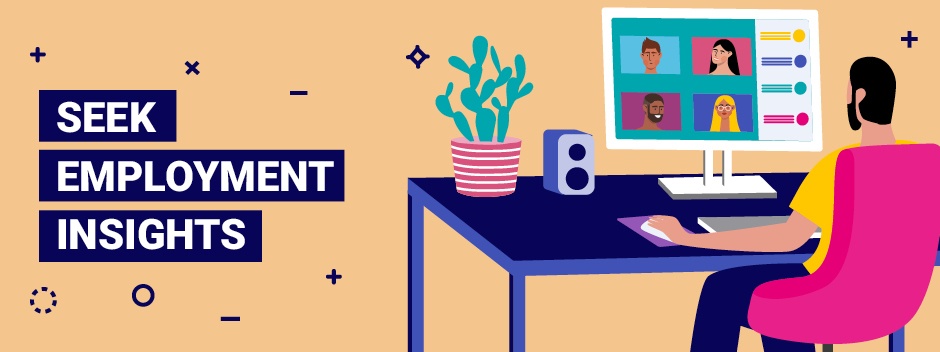
The latest data from SEEK shows new job ads posted during the fortnight ending 7 June were up by 60.6% compared to the April 2020 average. This is a further lift from 26.8% and 39.7% in previous two fortnights.
As far as industries go, the biggest contributors to job ad growth on SEEK are Trades & Services, Healthcare & Medical, Hospitality & Tourism, Manufacturing, Transport & Logistics and Education & Training. Roles in Consumer Services are also continuing to grow and are up by 184% compared to April.
Optimism is up, but uncertainty remains
So in the midst of easing restrictions, how are candidates and employees feeling? Well, in good news, optimism is on the rise.
Recent research conducted on behalf of SEEK shows optimism regarding future employment has reached 59%, compared to a low of 56% in March. Employees’ sense of job security has also returned to pre-COVID-19 levels – 66% compared to a low of 56% in March. Fewer people now feel that their working situation is very different to before the pandemic (32% in May versus 41% in April).
However, only 2% feel that their work has returned to normal. Despite the lift in optimism, uncertainty remains the most common emotion (43%) and 37% of people are feeling worried. This figure jumps to 50% for those who feel their company is not taking the situation seriously.
While restrictions are easing, one in three employees is still working from home. This may continue for some time, especially in states like Victoria and New South Wales, where the instruction is to remain working from home where possible. And of those working from home, 52% believe their interactions with colleagues are different now as a result of COVID-19 – often in a negative way. Almost 35% claim company culture is different as a result of COVID-19.

How to foster a stronger workplace culture remotely
The good news is that 64% of candidates who are working from home say their employer does at least one thing to stimulate workplace culture. It’s making a positive impact – those who say their workplace is taking steps to stimulate culture are more likely to feel ‘prepared’ (25% vs 9%) ‘reassured’ (8% vs 1%) less ‘anxious’ (23% vs. 42%).
For employers like financial technology company Beem It, where all 35 employees are continuing to work from home, clear communication has been vital to easing anxiety and maintaining a strong culture.
“Whether that be daily stand-ups within your team, weekly company meetings or virtual drinks and Pictionary on a Friday, we find the key to maintaining a positive work environment is keeping open lines of communication wherever possible,” says Jason Backhouse, Beem It's Head of Operations.
Backhouse adds that the lockdown has boosted the focus on innovation. “Trying to navigate the rapidly changing world has really allowed people to stretch their creativity and look for innovative customer solutions,” he says. “You need to embrace that and encourage the team to share ideas and drive them forward, then share the results so you can see the ideas realised, or learn from the misses.”
Focus on mental health
The uncertainty surrounding COVID-19 is continuing to take its toll on mental health. And for companies like SEEK, where all employees are continuing to work from home for now, supporting mental health has been priority.
Rebecca Supierz, SEEK’s HR Director SEEK ANZ & Asia Pacific Product & Technology, explains that in addition to an Employee Assistance Program, SEEK offers its ‘SEEKer Support’ program. The support program includes up to six paid for appointments – whether that’s with an employee’s preferred mental health specialist, or a SEEK-sourced provider. “Our primary goal for this program is that if people feel they need support, they can get it,” she says.
Supierz says the HR team has also been distributing tips and advice on staying connected with colleagues while working from home, and has adapted a range of face-to-face learning sessions to a virtual environment. “We’ve also had virtual mindfulness sessions,” she says. “And teams are also doing virtual yoga and meditation together.”

Communication is more important than ever
COVID-19 has had a profound impact on working lives. There have been job losses, stand-downs, reductions in working hours and a general sense of uncertainty.
The uncertainty experienced due to COVID-19 has made it even clearer that communication is highly valued among employees and that employee engagement should be a priority – in good times and in bad, says Backhouse. “When you have a highly engaged team that cares about the end product and user experience, they’re motivated to get work done and collaborate irrespective of the environment,” he says.
Supierz adds that open communication is now more crucial than ever. “It’s so important to be clear and transparent and only talk in facts when there is so much uncertainty everywhere else,” she says. “People appreciate feeling that they are not in it alone.”
Source: Independent research conducted by Nature on behalf of SEEK. Interviewing 4800 Australians annually.

